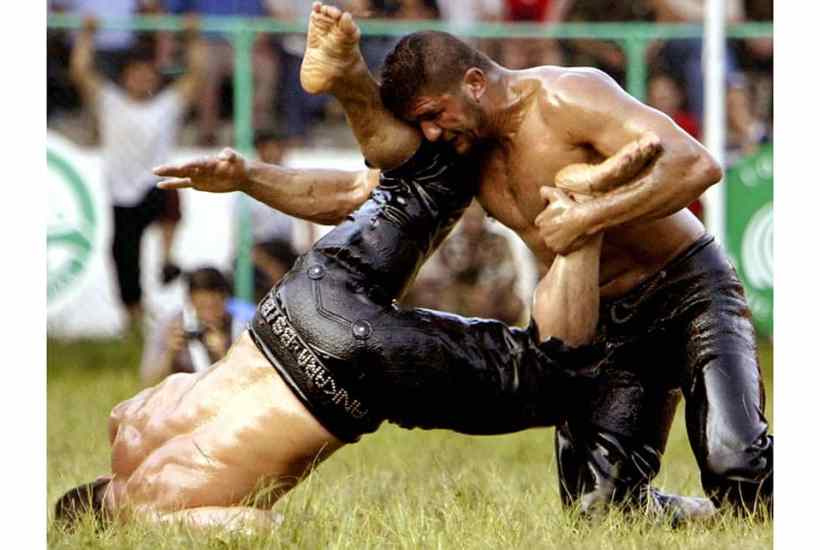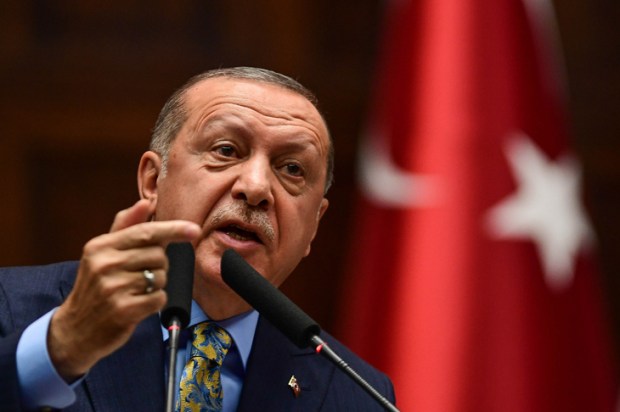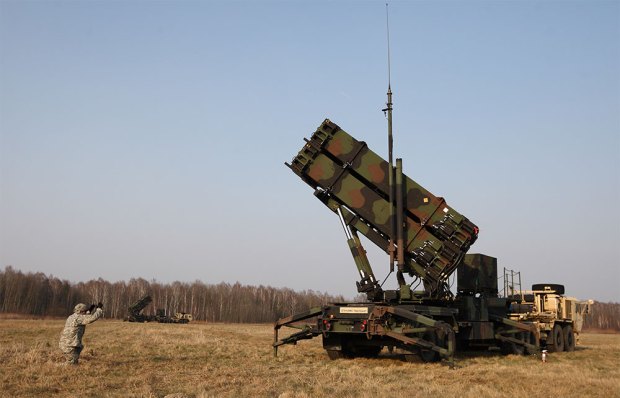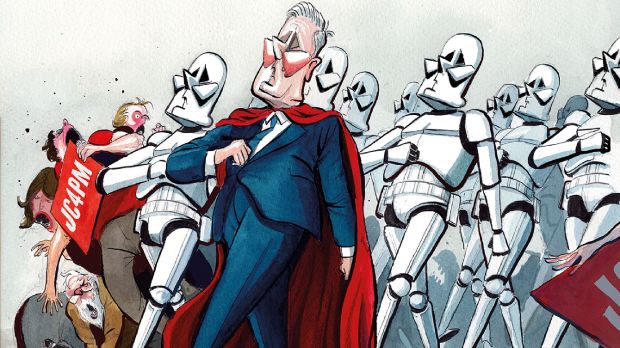Edirne, Turkey
There is a distinctive sound that an oiled-up palm makes as it slaps against an oiled-up pair of leather shorts. Both squelchy and sharp, this noise rings around the Thracian town of Edirne each July as it hosts Turkey’s biggest oil-wrestling championship. As the name suggests, contenders are greased up with either olive, corn or sunflower oil before they start to fight. The competition begins with a languid ritual in which the wrestlers stomp around each other, touching the ground and themselves before commencing their tussle. The winner must then flip his opponent on to his back, often by reaching into his shorts and grabbing hold of a tag sewn into the lining. It may look like a novelty event put on for tourists, but oil-wrestling is centuries old. The competition is taken so seriously in this sunflower- and olive-growing country that it is televised. In smoky teahouses, moustachioed old men tune in.
Three tonnes of olive oil were used over the course of the three-day Kirkpinar event, which makes it an expensive business at the best of times. These are not the best of times. In Turkish supermarkets, the price of olive oil is double what it was last year, and it is not the only product soaring beyond the reach of many Turks: as of last month, annual inflation is running above 78 per cent, according to official figures.
The minimum wage and state salaries have been hiked twice this year, and private companies are offering huge pay increases. But nothing is keeping up with runaway prices on shop shelves, at the petrol pumps and in estate agents’ windows. ‘The oil is actually the thing the wrestling teams spend least on,’ says Abbas Ulucan, 42, a former oil-wrestling champion who works for the state as a gymnastics teacher. ‘Fuel is the biggest problem in Turkey. Petrol was seven lira a litre at the end of last year, now it is 30 lira. This is affecting the working classes and the middle classes. It is not affecting the rich.’
Oil-wrestling is funded largely by benefactory businessmen who are repaid by having their names on billboards around the stadiums. There is still wealth in Turkey. In chichi Bodrum, season passes for luxury sun loungers are selling at 450,000 lira – 100 times Turkey’s average monthly salary – and there are plenty of expensive cars on the roads. Go out in Istanbul’s hipster neighbourhoods any night of the week and the bars are full. Swanky apartment blocks are still being thrown up across the city. But the lustre is a façade. Loose consumer credit is fuelling the boom and concealing the fact that many Turks are deep in debt. Meanwhile, 20 years of Erdoganism has created a new elite: loyal businessmen who repay lucrative state contracts with fealty.
The lira has lost 75 per cent of its value against the dollar since 2018. Given that Turkey imports more than 90 per cent of its fuel, this currency crash affects everything: even locally produced products such as olive oil still need to be transported to the shops. The war in Ukraine and pandemic aftershocks are contributing to Turkey’s problems too, but the biggest factor is the economic unorthodoxy of President Recep Tayyip Erdogan, who has declared himself the enemy of interest rates, a belief rooted in his staunch religiosity.
Erdogan has repeatedly overruled technocrats who dare to suggest that the base rate be raised to help cool the economy and stabilise the lira. To compensate, the central bank is performing financial alchemy to keep the economy from collapsing completely. In an attempt to top up central reserves, it is offering inflation-matching guarantees to persuade individuals and businesses currently keeping their savings in foreign currency to exchange them for lira. ‘It resembles Lebanon in many respects, but with much better public finances. It has the same problems of negative international reserves and likely skeletons in the cupboard,’ says Timothy Ash, an economist specialising in emerging markets.
Ulucan, the father of three young daughters, is surviving on a salary that has gone up by just 50 per cent this year, trailing far behind inflation. He is furious about the sudden drop in his circumstances, and the unwelcome new sense of anxiety over how much next month’s bills will total. Meanwhile his country’s rulers live in ever-increasing opulence. Erdogan’s latest palace, a summer retreat in Marmaris that was completed in 2019, is reported to boast 300 rooms and to have cost 640 million lira. ‘There needs to be a reckoning,’ Ulucan says. ‘There are bills to pay.’
Conversations that start with oil-wrestling can quickly turn into ones about politics. Elections will be held within the next year, and everything is seen through this prism. Take oil-wrestling itself, which last month was taken out of the jurisdiction of the Turkish Wrestling Federation by presidential decree and placed under the control of the Traditional Sports Federation, newly founded by Erdogan’s son Bilal. Ulucan is openly contemptuous of the move, and of Erdogan’s rule in general – and for that, he says, he has been blacklisted from teaching at any of the oil-wrestling clubs for the past decade. Actors, artists and journalists who criticise the president have faced similar career blocks.
Erdogan has reason to be paranoid: his approval ratings are at their lowest in his two-decade rule, largely due to anger over the economy. So he is turning to jingoism and foreign disputes to detract attention from what is going wrong at home. There is a new row with Greece in the Aegean, fresh threats of a military operation against Kurdish forces in Syria and continued threats to block Sweden and Finland from joining Nato.
For most Turks, the economy will decide how they vote. Erdogan seems to be banking on being able to keep his economic model running long enough to get through the election. Until then, it’s credit and circuses.
Got something to add? Join the discussion and comment below.
Get 10 issues for just $10
Subscribe to The Spectator Australia today for the next 10 magazine issues, plus full online access, for just $10.
You might disagree with half of it, but you’ll enjoy reading all of it. Try your first month for free, then just $2 a week for the remainder of your first year.














Comments
Don't miss out
Join the conversation with other Spectator Australia readers. Subscribe to leave a comment.
SUBSCRIBEAlready a subscriber? Log in